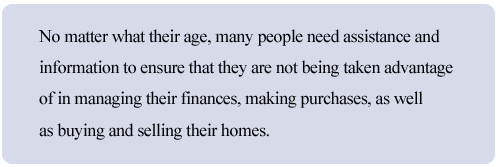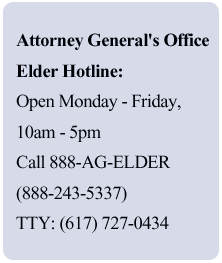

Elders have often been the target of organizations with a history of unethical business practices. Fortunately, there are both state and national resources that provide extensive information to guide elders and their
caregivers to ensure that they are protected from consumer fraud and abuse.
The Attorney General's Office runs four programs dedicated to the protection of elders and the investigation and prosecution of crimes against them.
 Elder Hotline is a toll free statewide hotline to assist elders and/or their caregivers. The Hotline, which is staffed by senior volunteers, provides dispute resolution services and is a comprehensive resource for information and referral on a full range of elder care concerns.
Elder Hotline is a toll free statewide hotline to assist elders and/or their caregivers. The Hotline, which is staffed by senior volunteers, provides dispute resolution services and is a comprehensive resource for information and referral on a full range of elder care concerns.
 Elder Abuse Project is a training grant to help professionals across the state
address the growing issue of elder abuse by improving the capacity of law enforcement, including police, prosecutors, victim-witness advocates, probation officers, and elder services professionals to more effectively recognize, investigate and prosecute a wide range of abuse perpetrated against older individuals. The project is funded by the Office on Violence Against Women at the U.S. Department of Justice.
Elder Abuse Project is a training grant to help professionals across the state
address the growing issue of elder abuse by improving the capacity of law enforcement, including police, prosecutors, victim-witness advocates, probation officers, and elder services professionals to more effectively recognize, investigate and prosecute a wide range of abuse perpetrated against older individuals. The project is funded by the Office on Violence Against Women at the U.S. Department of Justice.
This project has its own Elder Abuse Hotline 800-922-2275. It is open 24 hours a day, 7 days a week. The project also provides safety plans and mandated reporting forms that can be downloaded at this web site.
 Elder Advisories The Attorney Generals' office helps seniors to avoid falling prey to telemarketing scams by providing timely advisories on calls and mail they receive and on advertising they may see in the media. Recent advisories include information on sweepstakes, lottery clubs, donating cars to charity, among others.
Elder Advisories The Attorney Generals' office helps seniors to avoid falling prey to telemarketing scams by providing timely advisories on calls and mail they receive and on advertising they may see in the media. Recent advisories include information on sweepstakes, lottery clubs, donating cars to charity, among others.
 Elder Publications on issues of concern to elders and caregivers are available on the website for download free of charge: Attorney General's Office-MA > Elders > Elder Publications. Many of these publications can also be obtained in print format. If you do not have the ability to print format. If you do not have the ability to print from the website, call the Publications Line at 617-727-2200, ext. 2674, to request copies.
Elder Publications on issues of concern to elders and caregivers are available on the website for download free of charge: Attorney General's Office-MA > Elders > Elder Publications. Many of these publications can also be obtained in print format. If you do not have the ability to print format. If you do not have the ability to print from the website, call the Publications Line at 617-727-2200, ext. 2674, to request copies.
 Translation Services Some of the publications offered by their Attorney General's Office are available in the following languages: Cambodian, Cape Verdean, Creole, Chinese, Haitian Creole, Portuguese, Russian, and Spanish. Please visit: Attorney General's Office-MA > Elders > Elder Publications > Foreign Language Translations.
Translation Services Some of the publications offered by their Attorney General's Office are available in the following languages: Cambodian, Cape Verdean, Creole, Chinese, Haitian Creole, Portuguese, Russian, and Spanish. Please visit: Attorney General's Office-MA > Elders > Elder Publications > Foreign Language Translations.
More information about each program can be found on the Massachusetts Attorney General's website: Attorney General's Office > Elders > on any of the four programs described above.
The Attorney General's Office proper (as distinct from the two Hotlines) is reachable through the following numbers.

Massachusetts Attorney General's Office:
 Main Telephone 617-727-2200
Main Telephone 617-727-2200
 Central Massachusetts 508-792-7600
Central Massachusetts 508-792-7600
 Southeastern Massachusetts 508-990-9700
Southeastern Massachusetts 508-990-9700
 Western Massachusetts 413-784-1240.
Western Massachusetts 413-784-1240.
Better Business Bureau, Inc. (BBB) serves Eastern Massachusetts, Maine
and Vermont, and operates a Speakers Bureau providing information on a variety of topics including scams and
frauds to which elders may be particularly vulnerable,
and on action that elders and their caregivers can take to protect against such frauds. More information
is available at The Better Business Bureau web site, Better Business Bureau or by phone at
508-652-4856. For information about BBB speakers, call 508-652-4856.
Secretary of State's Office This office makes available a "Citizen's
Guide to Massachusetts State Services" that includes a Senior Citizens section with information on Elder
Protection Services and Programs. It is available on online at Secretary of State's Office-MA >
Citizens information services. A printed version is available for $15.00 (fifteen dollars) at the State
Bookstore. It can be ordered by phone: 800-392-6090 or 617-727-7030, (TTY: 617-878-8889) or by e-mail,
cis@sec.state.ma.us.

There are a number of national organizations that have valuable information
for those living in Massachusetts as well as other parts of the country.
American Association of Retired Persons (AARP) provides extensive information to assist elders in making sound decisions on a wide range of consumer issues on the website: American Association of Retired Persons > Money and Work > Be a Wise Consumer.
FirstGov for Seniors website provides a number of links to information
and assistance on all aspects of consumer protection and fraud protection. It also provides information
about nursing homes and long term care, as well as links to all state long term care
ombudsman programs. Visitors to the website can also sign up for e-mail updates. Go to: FirstGov for Seniors.

Making the decision to place an elder in a nursing home, also called an "extended
care facility" or a "long-term care facility"
is perhaps one of the most difficult decision a caregiver may face. (For more information about long-term
care facilities, see Housing & Transportation .) Having some assurance about the quality of care an elder will receive once
in the nursing home is of the utmost concern to caregivers. There are a number of state agencies and
organizations that have useful information to assist caregivers in locating nursing homes with a track
record for high quality care, and for making an accurate assessment of the care in the nursing home they
are considering choosing.
 Massachusetts Long Term Care Ombudsman provides assistance in securing information on nursing homes or resolving problems between nursing homes and residents and/or their families. Call 800-243-4636 or 617-727-7750.
Massachusetts Long Term Care Ombudsman provides assistance in securing information on nursing homes or resolving problems between nursing homes and residents and/or their families. Call 800-243-4636 or 617-727-7750.
 The DPH Survey Performance Tool for Nursing Homes is conducted every nine to fifteen months. Check a facility by name or location on line at Mass.Gov Topics A-Z > Nursing Homes > Nursing Home Report Card > Survey Performance Tool for Nursing Homes . Or call 617-753-8000. Each facility should have the most recent survey results on hand for elders and their caregivers to review.
The DPH Survey Performance Tool for Nursing Homes is conducted every nine to fifteen months. Check a facility by name or location on line at Mass.Gov Topics A-Z > Nursing Homes > Nursing Home Report Card > Survey Performance Tool for Nursing Homes . Or call 617-753-8000. Each facility should have the most recent survey results on hand for elders and their caregivers to review. 
 The Medicare Website provides a search tool to compare nursing homes across Massachusetts. It allows the consumer to search by locality or name. Medicare.Gov.
The Medicare Website provides a search tool to compare nursing homes across Massachusetts. It allows the consumer to search by locality or name. Medicare.Gov.
Similar information is available about Assisted Living Residences (ALRs) through the Executive Office of Elder Affairs (Elder Affairs) who certify ALRs at least biennially in Massachusetts and provides and Assisted Living Ombudsman Program to provide advocacy, information and complaint resolution to consumers. Call 617-727-7750 or 800-AGE-INFO (800-243-4636).

Aside from the program, run by the Attorney General's Office, described earlier, there are several other programs run by other state agencies to protect elders.
To get more information or assistance on these programs, call 800-AGE-INFO (800-243-4636) toll-free nationwide, (TTY toll-free in MA only 800-872-0166.)
These programs are also reachable at 800AgeInfo.com or send E-mail to: 800AgeInfo@umassmed.edu.
 Protective Services
Program Executive Office of Elder Affairs (Elder Affairs) works with the Attorney General's Office
and the Elder Abuse Hotline (800-922-2275, 24 hour, 7 days a week) to investigate and, when appropriate, intervene when there is evidence that an elder has been neglected, abused or financially
exploited by someone in a domestic setting.
Protective Services
Program Executive Office of Elder Affairs (Elder Affairs) works with the Attorney General's Office
and the Elder Abuse Hotline (800-922-2275, 24 hour, 7 days a week) to investigate and, when appropriate, intervene when there is evidence that an elder has been neglected, abused or financially
exploited by someone in a domestic setting.
 Elders at Risk (EAR) Program provides caseworkers through 22 non-profit agencies funded by Executive Office of Elder Affairs (Elder Affairs) to serve seriously at risk elders unable to meet their food, clothing, shelter, personal care, or medical care needs due to physical and/or mental impairments, substance abuse, or other serious problems. EAR services do not require the presence of an abusive or neglectful caregiver in order for services to be provided.
Elders at Risk (EAR) Program provides caseworkers through 22 non-profit agencies funded by Executive Office of Elder Affairs (Elder Affairs) to serve seriously at risk elders unable to meet their food, clothing, shelter, personal care, or medical care needs due to physical and/or mental impairments, substance abuse, or other serious problems. EAR services do not require the presence of an abusive or neglectful caregiver in order for services to be provided.
 Guardianships Elder Affairs contracts with seven agencies to provide Guardianship services to elders who have been abused, or determined by a court to be at risk and to lack decision-making capacity. This is done for elders who are unable to consent to services in order to provide protection when no other less restrictive means are available.
Guardianships Elder Affairs contracts with seven agencies to provide Guardianship services to elders who have been abused, or determined by a court to be at risk and to lack decision-making capacity. This is done for elders who are unable to consent to services in order to provide protection when no other less restrictive means are available.

<< Legal Resources/Elders & Caregivers | Home/Health Care & End of Life Care >>